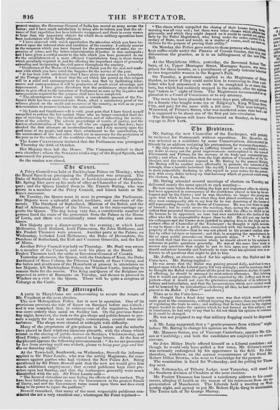Zbe Vrobinces.
Mr. Baring, the new Chancellor of the Exchequer, will probably be reffiected for Portsmouth without opposition. Dr. Quarrier, wt was selected as a candidate by some Conservatives, disconcerted his friends by an address resigning his pretensions, for reasons thus stated-- " My only ambition in doing so (offering himself as a candidate) would is amy desire to carry out the great improvements contemplated in the towns! Portsmouth and Portsea, for the increase of its trade and commercial pus. verity; and when I consider, from the high station of Chancellor of the Et. chequer, and the confidence reposed in Mr. Baring by the present Ministry, Air. Baring will be enabled inure effectually to promote the interents of the borough, than a humble individual like myself, I cannot for a moment bait* in most respectfully declining to offer myself to your notice for the present; and, with every desire to keep up that harmony which at present exists among the electors, I am, tke.
Mr. Jeffrey, an elector, asked for his opinion on the Ballot and the I Corn-laws. Mr. Baring replied— He was aware that the Ballot was gaining ground daily, and that Urns f subject upon which the Liberal party felt very strongly; and he must say, that d he thought the Ballot would attain all the good its supporters declare it capable of effecting, he should be amongst it most ardent advocates. But,belierag that it would not produce the good effects expected by Mr. Jeffrey and its UP- porters—that it would not cure the grievances complained of in reference to bribery and intimidation, and that the inconvenience which now existed would not he lessened by its introduction—both:vine all this, he had remained an op. ponent to the Ballot. ("Hear !" and cheers.,
Then as to the Corn-laws-
He thought that a fixed duty upon corn was that which would probes more good to the community, without injuring the grower, than any other mode of regulating the trade in corn ; and nothing that he had heard in the slightest degree tended to shake the opinion which Ins had formed on this subject; and in conclusion, he had only to say that he did not think his opinion in reference to it could be changed.
lie d was not prepared to say that military flogging could be dispense wi A Mr. Lang suggested, that a "gentle pressure from without" might induce Mr. Baring to change his opinion on the Ballot.
Mr. Manners Sutton, son of Viscount Canterbury, opposes Mr. Gib- son at Cambridge ; and both the candidates are employed in an active canvass.
Sir John Milley Doyle offered himself as a Liberal candidate ; and though he would only have polled a few votes, Mr. Gibson's.sueeess was seriously endangered by his appearance in the field. Sir John, therefore, withdrew, on the earnest remonstrance of his friend Mr. Robert Dillon Browne, who went to Cambridge for the purpose. The nomination is fixed for Wednesday, and the polling for Thant day next.
Mr. Tollemache, of Tilbury Lodge, near Tarporley, will stand for the Southern division of Cheshire at the next election.
Mr. Poulett Thomson has issued a valedictory address to his condi' tuents, alleging ill health as the reason of his retirement from the re- presentation of Manchester. The Liberals held a meeting on Vir.cd• nesday night, and agreed to put Mr. Robert Hyde Greg in nomination. The Tories talk of Sir George Murray. Mr. Baring attended several meetings of electors on Tuesday, sal delivered nearly the same speech to each meeting— He now came before them holding the high and important office to whieltie lied been appointed in consequence of the confidence placed in him by Meal. leagues and by the Crown ; and lie was, therefore, no longer the young sea upon trial, which Ite had been when they first placed confidence in him, 111111 they were consequently able to say how far he was deserving, of the honored still representing them in the House of Commons. He was not there to rpak of himself; but he could assure the meeting, that, seeing the very great diffi- culties that presented themselves in connexion with the office to which he hul the honour to he appointed, no man had ever undertaken the duties of that office who felt its responsibility deeper than he did. He did not say how fa his colleagues and the Crown were justified in placing him in the high maim- portant office of Chancellor of the Exchequer: he thought it right, however, to say to them—for as a public man, connected with the borough, he was the property of the electors—that he was not placed in his present exalted sites- tion by either intrigue or interest ; and that, in accepting the appointment, he did so upon public grounds—on those grounds alone. • * * • He did not think that that was an occasion where Ile should advert to his opinions in reference to public questions generally. He was at the same time ready to answer any questions that might be put to him upon any subject; teethe should endeavour honestly and fearlessly to state what his opinions were inn- ference to all questions that might be put to hint.


























 Previous page
Previous page